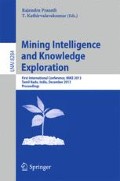Abstract
We present a method to perform automatic tagging of contextual factors associated with mobile payments data. Users specify a short description about the contextual factors interesting to them. The proposed system characterizes these factors and generates the knowledge concepts, similar to [1,2], but with the help of corpus statistics. These knowledge concepts describe the factors in terms of multi-faceted information search. Secondly, given a query, the underlying retrieval system retrieves top k texts pertaining to user information needs. Then based on the similarity between each of the knowledge concepts and the best matching texts, the context matching score is computed. Then the ranked sequence of contextual tags are assigned to the each retrieved text. The experimental results show that the proposed approach characterizes the context from user specified factors and performs the contextual tagging of the retrieved texts in a better way.
Access this chapter
Tax calculation will be finalised at checkout
Purchases are for personal use only
Preview
Unable to display preview. Download preview PDF.
References
Gabrilovich, E., Markovitch, S.: Computing semantic relatedness using wikipedia-based explicit semantic analysis. In: Proc. of the 20th Int. Joint conf. on Artifical intelligence, IJCAI 2007, pp. 1606–1611. Morgan Kaufmann Publishers Inc. (2007)
Prasath, R., Sarkar, S.: Unsupervised feature generation using knowledge repositories for effective text categorization. In: Proceedings of the 2010 Conference on ECAI 2010: 19th European Conference on Artificial Intelligence, pp. 1101–1102. IOS Press, Amsterdam (2010)
Pedersen, T., Kulkarni, A.: Identifying similar words and contexts in natural language with senseclusters. In: Proc. of the 20th National Conf. on Artificial Intelligence, AAAI 2005, pp. 1694–1695. AAAI Press (2005)
Johnson, W., Lindenstrauss, L.: Extensions of lipschitz maps into a hilbert space. Contemporary Mathematics 26, 189–206 (1984)
Blei, D.M., Ng, A.Y., Jordan, M.I.: Latent dirichlet allocation. J. Mach. Learn. Res. 3, 993–1022 (2003)
Blei, D.M.: Probabilistic topic models. Commun. ACM 55(4), 77–84 (2012)
Griffiths, T.: Gibbs sampling in the generative model of latent dirichlet allocation. Technical report, Stanford University (2002)
Brown, L.G.: Convenience in services marketing. Journal of Services Marketing 4(1), 53–59 (1990)
Duane, A., O’Reilly, P., Andreev, P.: Trusting m-payments - realising the potential of smart phones for m-commerce: A conceptual model & survey of consumers in ireland. In: ICIS 2011 (2011)
Kelman, H.C.: Compliance, identification, and internalization three processes of attitude change. Journal of Conflict Resolution 2(1), 51–60 (1958)
O’Reilly, P., Duane, A., Andreev, P.: To m-pay or not to m-pay - realising the potential of smart phones: conceptual modeling and empirical validation. Electronic Markets 22(4), 229–241 (2012)
Schierz, P.G., Schilke, O., Wirtz, B.W.: Understanding consumer acceptance of mobile payment services: An empirical analysis. Electron. Commer. Rec. Appl. 9(3), 209–216 (2010)
Roca, J.C., García, J.J., de la Vega, J.J.: The importance of perceived trust, security and privacy in online trading systems. Inf. Manag. Comput. Security 17(2), 96–113 (2009)
Mallat, N.: Exploring consumer adoption of mobile payments - a qualitative study. J. Strateg. Inf. Syst. 16(4), 413–432 (2007)
Lee, S.Y.: Examining the factors that influence early adopters’ smartphone adoption: The case of college students. Telematics and Informatics (to appear, 2013)
Author information
Authors and Affiliations
Editor information
Editors and Affiliations
Rights and permissions
Copyright information
© 2013 Springer International Publishing Switzerland
About this paper
Cite this paper
Prasath, R., O’Reilly, P., Duane, A. (2013). Automatic Tagging of Texts with Contextual Factors Using Knowledge Concepts. In: Prasath, R., Kathirvalavakumar, T. (eds) Mining Intelligence and Knowledge Exploration. Lecture Notes in Computer Science(), vol 8284. Springer, Cham. https://doi.org/10.1007/978-3-319-03844-5_67
Download citation
DOI: https://doi.org/10.1007/978-3-319-03844-5_67
Publisher Name: Springer, Cham
Print ISBN: 978-3-319-03843-8
Online ISBN: 978-3-319-03844-5
eBook Packages: Computer ScienceComputer Science (R0)

